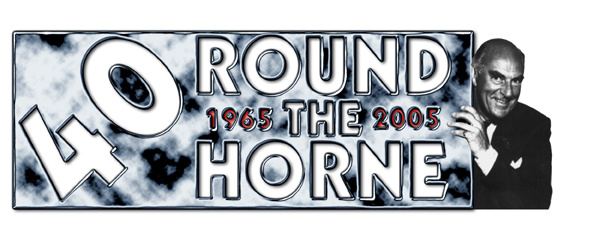

The entire 4 seasons are now available individually in Collectors Boxed Sets or as a mega set, containing all the individual releases and The Complete and Utter Round The Horne digipack. If you can't afford to buy them all at once, or have not pregressed to CD, then you can still pick up various editions on audio cassette, and if you are really strapped for cash, the show is regulalry aired on the digital radio channel, BBC7, available on DAB, Freeview, or Satellite. So now you know how to get the shows, a little about their history. After a disagreement with the BBC, Eric Merriman decided not to continue writing Beyond Our Ken and so Barry Took (who originally collaborated with Merriman) and Marty Feldman were commisioned to write a new series. Originally to be titled, It's Ken Again, it was thankfully renamed Round the Horne. Once again the show starred Kenneth Horne, with Kenneth Williams, Hugh Paddick, Betty Marsden, and Bill Pertwee, and Douglas Smith, as announcer, became a more integral part of the performance (providing many sound effects and all the advertising for Dobbiroids!). The show ran for four seasons with one a year from 1965 - 1968. Plans were afoot for further seasons, although by this time Betty Marsden was ready to move on, and would have probably been replaced by Joan Sims, however, the untimely death of Kenneth Horne from a heart attack changed these dramatically (what finally appeared was Stop Messing About!). Horne's legacy was 66 episodes of some of the best comedy around, and it is not surprising that out of all the comedy shows on radio, the three that are regarded as the creme de la creme are The Goon Show, Hancock's Half Hour, and Round The Horne.The first 50 or so scripts were jointly written by Barry Took and Marty Feldman, with the last season seeing the departure of Feldman (so that he could persue his own performing career) and the involvement of Johnnie Mortimer, Brian Cooke, and Donald Webster, however, Feldman was still consulted on the Julian and Sandy sketches for the season. Musical diversion was provided by The Fraser Hayes Four (a close harmony quartet), and at various times Edwin Braden, Paul Fenoulhet and the Hornblowers, and the Max Harris Group. The entire run was produced by John Simmonds, and all shows were originally broadcast on the Light Programme (later to convert to Radio 2), with recording sessions taking place at the Paris Studios, Lower Regent Street of a Monday lunchtime